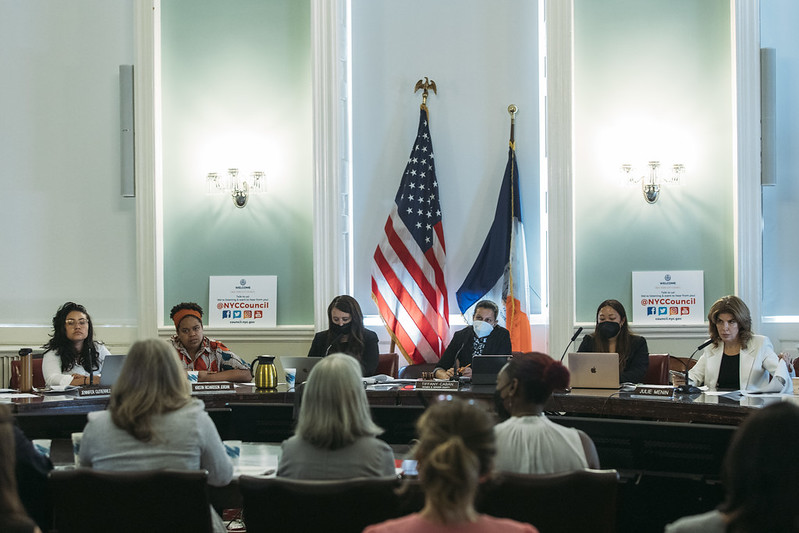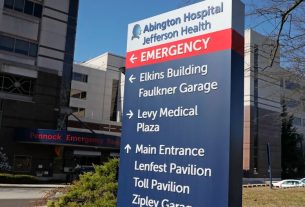[ad_1]

City Council hearing on maternal health (photo: Emil Cohen/NYC Council)
At a hearing this past week, New York City Council Members discussed a package of legislation related to maternal health, mortality, and morbidity and seeking to address healthcare inequities as well as the Supreme Court decision to overturn Roe v. Wade constitutional abortion protections. The joint hearing held by the Council’s Committee on Health and Committee on Hospitals dealt with 13 bills and resolutions.
That legislation includes calling on the state to require full insurance coverage for fertility treatments, increased access to data about maternal mortality and morbidity, the creation of a pilot program to provide doula and midwife services to city residents, the establishment of a Sexual and Reproductive Health Office within the Department of Health and Mental Hygiene (NYC DOHMH), and more.
Other resolutions called on the New York State Legislature and Governor Kathy Hochul to make doulas more accessible to individuals with Medicaid or those without health insurance, and urged President Joe Biden to sign the Black Maternal Health Momnibus Act of 2021, which seeks to close racial gaps in maternal health outcomes.
In their opening remarks, Queens Democrat Lynn Schulman, the chair of the Committee on Health, and Brooklyn Democrat Mercedes Narcisse, the chair of the Committee on Hospitals, emphasized that New York is a safe haven for individuals seeking abortions from states where the reversal of Roe has effectively meant abortion is outlawed as well as states that may soon pass laws to join that list.
In the wake of a leaked draft opinion in May and the court’s June ruling, Democrats who control New York state and city governments have been passing new legislative and budgetary measures to bolster the state’s already strong abortion rights and reproductive health care efforts. Those efforts are ongoing at both levels of government.
“Our country has a long history of discrimination and structural inequality that is deep-seated within the healthcare system,” Schulman said. “This decision will only exacerbate this, with post-pregnancy policies disproportionately affecting people of color, immigrants, LGBTQIA+ individuals, young people and those who are poor.”
Both Schulman and Narcisse said the Supreme Court ruling will disproportionately affect people of color who have already experienced higher maternal mortality and morbidity rates than their white counterparts, a trend that was the original impetus for much of the legislation examined at the hearing and a topic that many of the new City Council — the first with a female majority — and other newly-elected officials including Mayor Eric Adams and Brooklyn Borough President Antonio Reynoso promised to take on during last year’s campaigns.
According to Schulman, recent data obtained by the City Council shows that Black mothers in New York City are eight to 12 times more likely to die from pregnancy-related complications than white mothers. The Centers for Disease Control and Prevention reported in April that Black women are three times more likely to die from a pregnancy-related cause nationwide, meaning that the crisis is far worse in New York City.
“The fact that Black women and birthing people are not receiving the care and resources they need to survive during childbirth is inexcusable and morally reprehensible,” said Narcisse, who has been a nurse for more than 30 years.
After Council members introduced their proposed bills, they had the opportunity to ask questions to representatives from the city’s health department (DOHMH) about the city’s plans to improve abortion access and combat maternal health inequities.
Michelle Morse, the Chief Medical Officer of DOHMH, pointed to how the city has continued to address birth inequities and the maternal health crisis — which she noted has been driven by racism and bias in government, medicine, education, housing, economic policies and more — by developing programs and strategies using data that focuses on the pregnancy outcomes of Black and Latino women.
Morse highlighted several city services that have been providing more equitable reproductive healthcare, such as the Nurse-Family Partnership, Newborn Home Visiting Program and By My Side Birth Support Program, and partnerships with hospitals and community-based groups, including the Maternal Mortality Morbidity and Review Committee, the Maternity Hospital Quality Improvement Network, the New York City Breastfeeding Hospital Collaborative, the Birth Equity Working Group, and more. She also lauded the expansion of the Citywide Doula Initiative from Brooklyn to all boroughs in late March; the program sought to provide free access to doulas for 500 families by the end of June.
“We envision a world where all New Yorkers with healthy, fulfilling sexual and reproductive lives, where all children are born healthy, nutured and loved, and where all births are safe — we are committed to making that vision a reality,” Morse said in her opening statement. “Turning to the legislation being heard today, the bills in this package cover a wide range of protections for pregnant people and those who may become pregnant.”
Morse said the city supports the intent of several City Council bills, but noted how the department already provides similar services to some pieces of the legislation that were introduced.
This included providing education about city standards for respectful care at birth, health care proxy forms and patients’ rights; increasing access to data on maternal mortality and morbidity; establishing a program in the department to train doulas and provide services; requiring reports on polycystic ovary syndrome and endometriosis; establishing an Office of Sexual and Reproductive Health (the current office is called Bureau of Maternal, Infant and Reproductive Health); requiring family building benefits for city employees; and working on public education and outreach campaigns about the risks of caesarean sections.
It was apparent at the hearing that the proposed bills would codify in law several current DOHMH programs and practices, an effort that could create new bureaucratic challenges for the department but also ensure the permanence of those programs and practices and give the City Council and the public more assurances, protections, and clarity.
During the questioning period, Schulman first asked about how the city will be impacted by the Court overturning Roe v. Wade. Laura Louison, assistant commissioner for the Bureau of Maternal, Infant and Reproductive Health at DOHMH, said that the department has been preparing for the decision over the last two months and has been working to protect existing abortion access with community-based organizations and other governmental entities.
Louison added that the city is preparing for an influx of people seeking abortions who live in states where the procedure is restricted, and that the city has been developing plans to provide accurate information about abortions to the public and providers, as well as support the expansion of services in collaboration with clinicians.
Asked by Council Member Julie Menin, a Manhattan Democrat, about how the Bureau of Maternal, Infant and Reproductive Health is specifically preparing for an increase in demand of abortion services, Louison said it is in the process of determining staffing and infrastructure needs to meet the anticipated increase in demand at the bureau.
Louison did not have the exact number of referrals from the Bureau of Maternal, Infant and Reproductive Health to people seeking affordable abortion services, but said the bureau is developing strategies to provide more information about abortion access to the public and is working with the New York State Department of Health to respond to states that may try to restrict travel for abortion services.
Council Member Marjorie Velázqez, a Bronx Democrat, followed up expressing concerns about anti-abortion “crisis pregnancy centers” that try to pass themselves off as abortion clinics. “They are deceptive practices and they hurt our communities, especially Black and brown ones like mine,” said Velázqez.
Louison responded by saying that DOHMH will be working with the Department of Consumer Affairs on a communication campaign, and that the department has updated its website to include information about fake clinics and how to file a report. When asked about intimidation or harassment while providers and patients visit places with abortion services, Louison said the New York State Department of Health has increased funding for security and the New York City Police Department will start to remove and prosecute anti-abortion protesters if they break the law by preventing people from accessing abortion services.
“Abortion is legal in New York City, and it is safe, and we have seen increased protester presence at the healthcare facilities that provide abortions throughout the five boroughs, Louison said. “In order to uphold our commitment to safe and legal abortion, we need to ensure that patients are not harassed or intimidated when they are entering the clinic, and that is also true for providers.”
Velázquez added that she is currently undergoing in vitro fertilization (IVF) and has experienced a lack of accessibility and communication with her provider. In apparent reference to the New York State Infertility Demonstration Program, she pressed the panel to review the program and said she was worried for other city employees who are also affected. “We have an opportunity here to say, ‘Let’s reconfigure this so it can be accessible, because accessibility is part of the ability to manage this situation and this healthcare procedure,” Velázquez said.
Council Member Rita Joseph, a Brooklyn Democrat, also asked about access to language services for new mothers. Machelle Allen, the Senior Vice President and Chief Medical Officer at New York City Health + Hospitals, the public hospital system, said there are many different languages offered in city facilities, which also have access to a language line to call for interpreters. On inclusivity training, Allen said that there has been anti-bias training systemwide among senior leadership and frontline staff, and the human resources department has adopted its own diversity and implicit bias training.
Following the administration testimony period, Council members listened to public testimony from city officials and reproductive health advocates, including Brooklyn Borough President Antonio Reynoso, Deputy Bronx Borough President Janet Peguero on behalf of BP Vanessa Gibson, Greater New York Health Association Senior Vice President Lorraine Ryan, The Motherhood Center of New York founding Director Paige Bellenbaum, midwife Patricia Loftman on behalf of New York Midwives, and Sickle Cell Thalassemia Patient Network President Teresa Ginger Davis. Many talked about their own experiences with the maternal health crisis and emphasized their support for the proposed bills.
“New York is at a historic moment with a female leadership team at Bronx Borough Hall, the New York City Council, and on the state level,” Peguero said. “Now, more than ever, with the ruling of Roe v. Wade, we need stronger legislation at the local level to support women and lead this progressive national effort to ensure that standards of respectful care at birth become universal.”
During her testimony, Ryan of Greater New York Health Association noted how the racial disparities seen in pregnancy outcomes, as well as for prenatal and postpartum care for women of color, have persisted in recent years, despite supportive programming from the the state and city health departments, the American College of Obstetricians, the Gynecologists and the Greater New York Health Association, and other organizations. She pointed to the challenges that hospitals continue to face, particularly with inconsistent Medicaid rates and the inability to properly expand services across the system.
“We know that in-hospital care, pre-pregnancy, prenatal, postpartum, is not enough,” Ryan said. “It’s what we do for patients in the community in regards to housing, education, transportation, and employment. The four walls of a hospital setting alone cannot guarantee the best outcomes.”
Reynoso, who has said his top initial priority as borough president is to improve Black maternal health and reduce racial disparities in maternal care, testified that his Brooklyn Borough Hall has invested $15 million and other resources into the borough’s public hospitals to ensure Black and Latino women receive sufficient care. He expressed concern for how midwives are treated compared to doctors and others in the NYC Health + Hospitals system, and mentioned how patients have waited more than four hours to see a midwife, doctor, or other care providers.
“We’re hoping to make Brooklyn the safest place for all women to have babies within four years, and hopefully within eight Brooklyn is the safest place in the country for women to have babies,” said Reynoso, who took office in January. “Infrastructure is one part of a bigger problem when it comes to maternal mortality.”
Bellenbaum of The Motherhood Center of New York highlighted that one in five new and expecting mothers experience perinatal mood and anxiety disorders (PMAD), and their risk and severity have been driven by racism and low economic status in addition to neurochemical causes. She said she was fortunate to be speaking to the City Council after almost losing her life 16 years ago to a PMAD. “Shame on us as a city for neglecting the mental health needs of expecting mothers and birthing parents,” Bellenbaum said.
City Council Speaker Adrienne Adams, who was not in attendance during the hearing, released a statement thanking Schulman and Narcisse for holding the discussion. She said the overturning of Roe v. Wade is representative of gender-based violence and will disproportionately impact Black people, people of color, low-income and marginalized communities.
“To put it plainly, this decision by the Supreme Court will cause women and birthing people to die,” Adams said. “I look forward to working with these committees and the administration to do whatever we can to pass this important legislation and make New York City a safe place for all women and birthing people.”
[ad_2]
Source link


